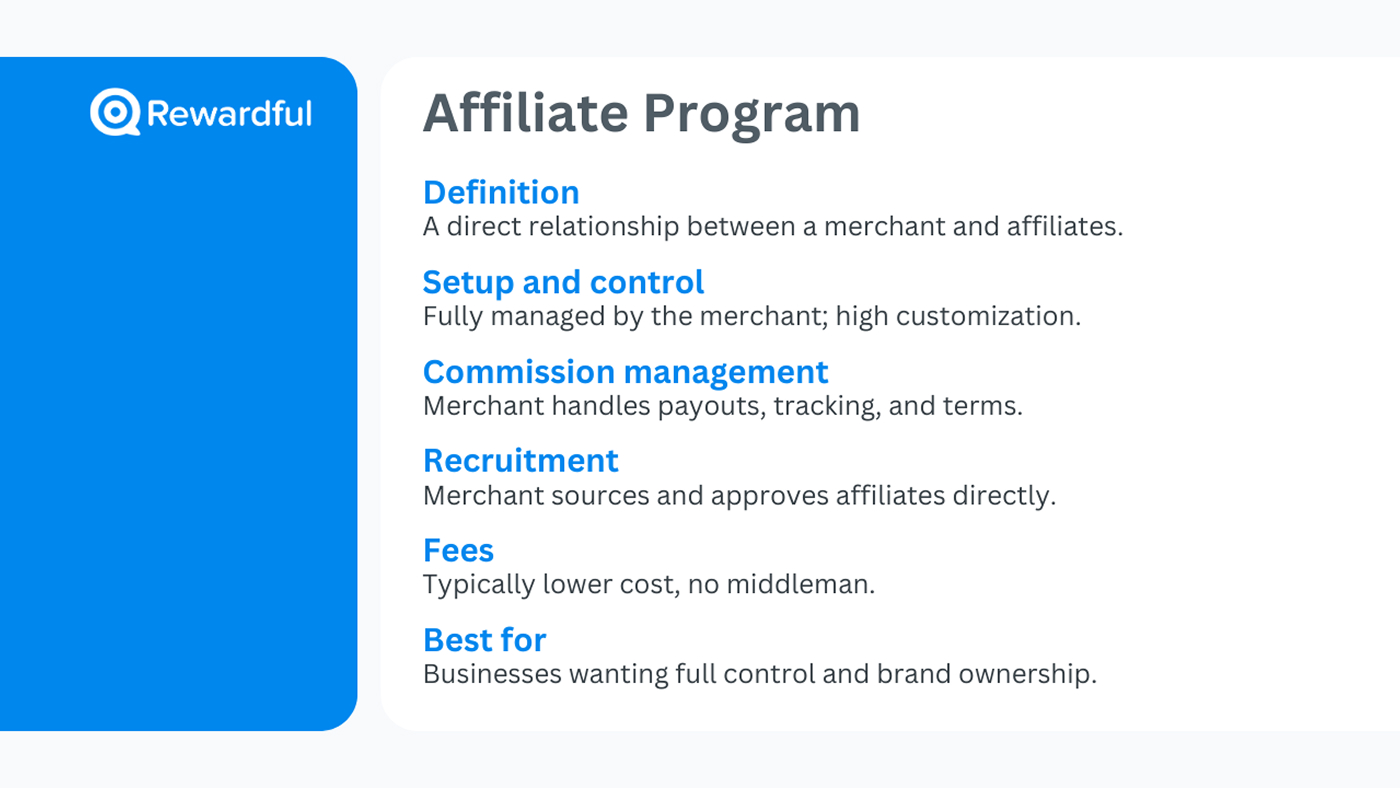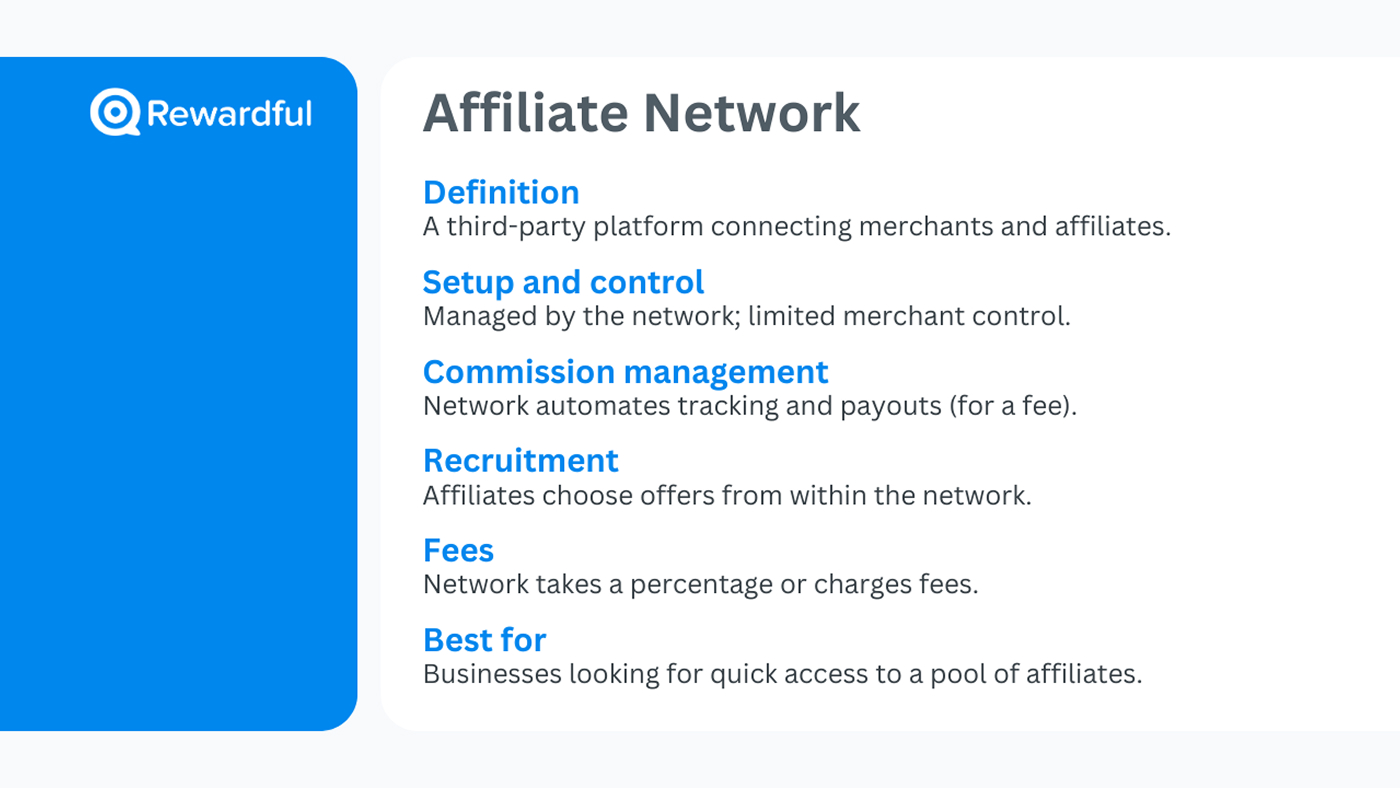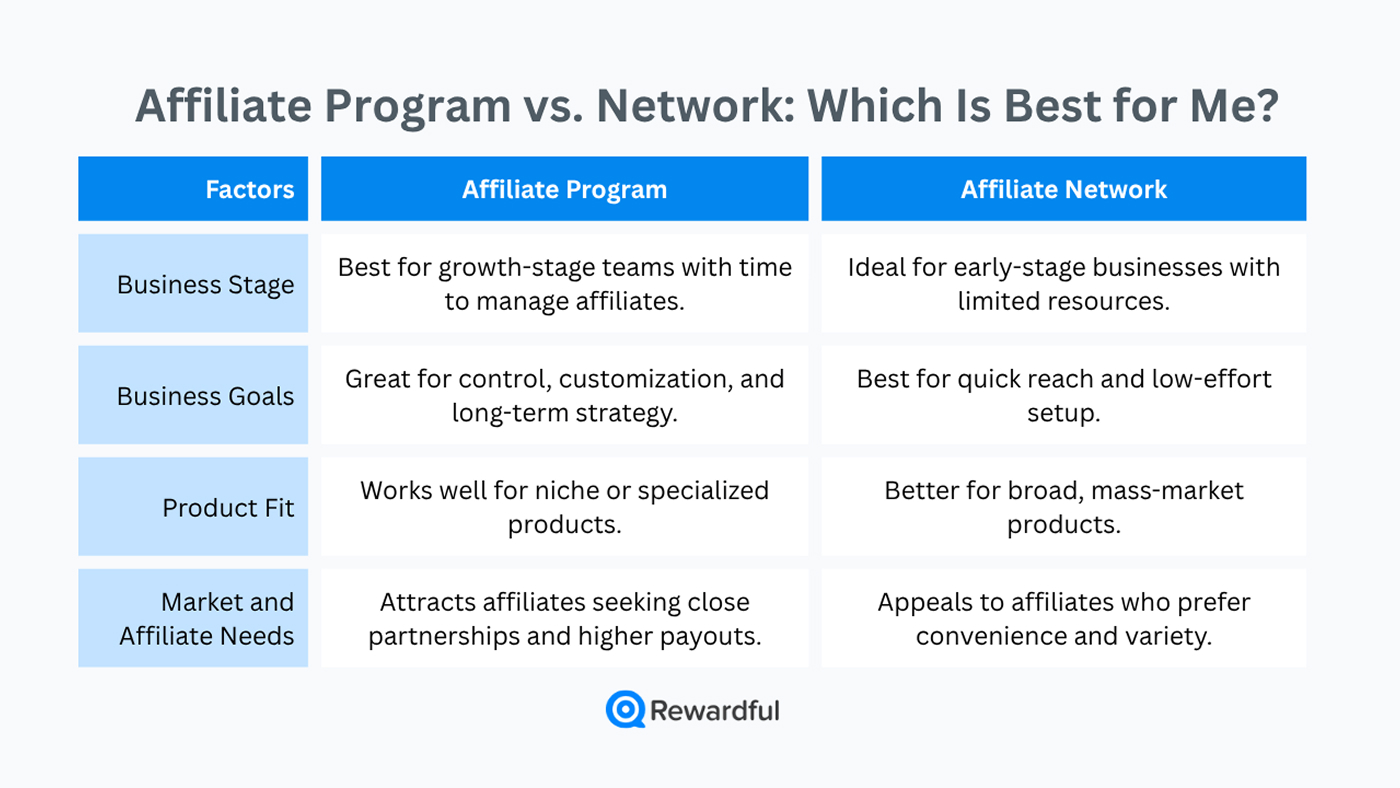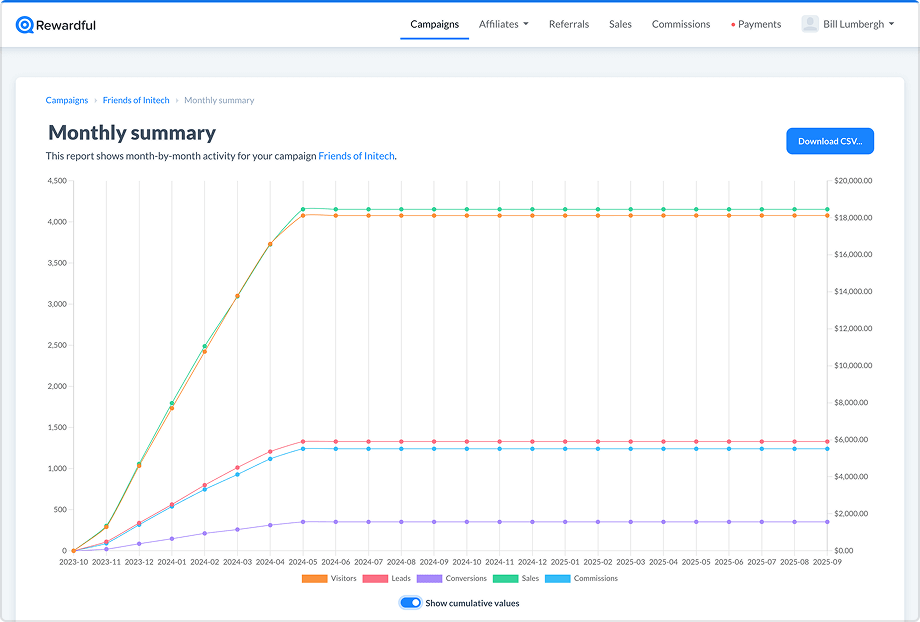Affiliate program vs. affiliate network—which makes more sense for your business? If your business is exploring affiliate marketing as a growth strategy, understanding the differences between these two models is crucial. Each comes with its own benefits and challenges, and choosing the right one depends on your goals, resources, and how much control you want over partner management.
We’ll break down the pros and cons of running your own affiliate program versus joining a network, helping you make an informed decision that supports your affiliate marketing strategy.
Comparison of Affiliate Program and Affiliate Network
See the similarities and differences between affiliate programs and affiliate networks.
What is an Affiliate Program?

An affiliate program is a direct arrangement between a merchant (a business selling products or services) and affiliates (marketers who promote these products or services in their own network). It's a structure where you reward affiliates for directing customers to your products or services. This usually involves setting the entire affiliate program from scratch, including deciding the commission rates and types, who to recruit and how, and promotion strategies.
Here are some key details on how an affiliate program runs:
- Setting up an affiliate program: generally, you’d use specialized affiliate management software to craft, oversee, and track your program.
- Recruiting affiliates: this is done by engaging with individuals or companies passionate about promoting your products.
- Managing commissions: there are different ways you can determine commission structures and rates to fairly compensate affiliates based on their performance.
Many businesses that run an affiliate program use affiliate management software to effectively manage their affiliates. This software serves as the backbone of your program, automating complex tasks like tracking conversions, calculating commissions, and processing payouts.
Beyond automation, affiliate management tools help eliminate manual tracking errors, provide real-time analytics to optimize performance, and streamline communication with your affiliate network—all while saving you countless hours of administrative work.
The Pros of Running an Affiliate Program
- Control: you have absolute control over who promotes your products and can set up rules to have some control over how they promote them. For instance, you can create rules on what is allowed in terms of advertising in search engines.
- Direct relationships: you can build strong relationships with your affiliates by providing them with direct communication and support. This is not just a plus, it’s a must for running a successful program.
- Fewer middleman fees: you are not subject to network fees; you simply pay your affiliates and for the software you use to run your program with.
- Professional scalability with affiliate software: modern affiliate management platforms give your program a competitive edge by providing sophisticated tracking capabilities, customizable commission structures, and professional-grade reporting dashboards. This tech allows you to scale from managing a handful of affiliates to hundreds or thousands without losing oversight or accuracy, all while presenting a polished experience that attracts higher-quality affiliates to your program.
The Cons of Launching an Affiliate Program
- Time-consuming management: it does require hands-on management, mostly in communicating with affiliates. Choosing the right affiliate software makes it easier to have oversight and can serve as an easy-to-reach base camp for everyone involved.
- Limited reach: depending on your niche, you are potentially restricted access to affiliates. It’s quality over quantity, so double down on finding high value affiliates.
Who is an Affiliate Program for? Best Use Cases
Affiliate programs work for all types of businesses, but it generally works best if your business has a clear assortment or product. Think of a SaaS product for freelancers.
Let’s say your company built a time tracking and invoicing tool for solo entrepreneurs, you can engage with influencers in that industry to promote your product. When sales occur through their efforts, you reward them with a commission.
Related: The Best Commission Setup for Affiliates
What are Affiliate Networks?

An affiliate network serves as an intermediary between merchants (you) and affiliates. Essentially, it is a platform connecting various merchants and affiliates.
Businesses can join the network, enlist their products, and affiliates select what they wish to promote. And when it comes to affiliate commissions, the network handles the hassle. For example, tracking sales and disbursing commissions, and retaining a percentage for themselves.
The Pros of Using an Affiliate Network
- Ease of use: sit back and relax. With a centralized platform, the setup and management process becomes more straightforward.
- Access to diverse affiliates: your products will get exposure to a vast network of affiliates, expanding your reach. You don’t need to promote your program as much.
- Uniform procedures: there are common rules and guidelines across various programs within the network, making it easy to streamline your affiliate marketing efforts.
The Cons of Leveraging an Affiliate Network
- Network fees: the networks you work with take fees or part of the commission.
- Less control: you have limited direct control over affiliate relationships because the network handles communication with each network affiliate.
Who is an Affiliate Network for? Best Use Cases
Imagine a bustling virtual marketplace filled with different stores (merchants) displaying their items, while salespeople (affiliates) select the products they'll advocate. The marketplace manager (affiliate network) takes care of the administrative functions.
Affiliate Programs and Affiliate Networks: What are the Key Differences?
Now you know how both these programs work, it’s time to compare them from different perspectives.
1. Based on Customization Opportunities
When it comes to tailoring your affiliate marketing approach, the level of customization you can achieve varies significantly between running your own affiliate program versus joining an affiliate network. Let's have a look at the differences.
Customization Options for Affiliate Program (Managed with Software)
Using affiliate management software gives you a high level of control and customization over your program. You’re in the driver’s seat; able to shape your affiliate strategy to fit your business goals. With the right tool, you can create custom commission tiers to reward top performers with higher rates or offer special bonuses for promoting specific products. This flexibility makes it easier to keep affiliates motivated and aligned with your priorities.
On top of that, many platforms offer white-label affiliate portals, allowing you to fully brand the experience with your company’s colors, logo, and messaging. This helps affiliates feel like they’re part of your team, not just another third-party program. You also have full control over branded creatives, so your promotional materials can perfectly reflect your brand’s voice and visual identity.
Modern affiliate software takes this personalization even further. You can customize everything from cookie durations and payout schedules to advanced tracking parameters and campaign-specific rules. The result? An affiliate program that doesn’t just function efficiently—it feels uniquely yours from top to bottom.
Customization Options for Affiliate Network
Affiliate networks typically offer limited customization options since they're designed to serve multiple merchants with standardized processes. While you might be able to set basic commission rates and provide some branded materials, you're generally working within the network's existing framework, so being diverse is harder.
Additionally, your affiliate portal will likely carry the network's branding, and you'll have minimal control over the user experience your affiliates encounter. That said, most networks do allow you to upload your own banner ads and promotional copy, but the overall look and feel remains consistent across all merchants on the platform. This standardization can actually be a benefit for simplicity, but it means sacrificing the personalized touch that builds stronger brand loyalty.
2. Seen from the Merchants’ Perspective
Benefits of Affiliate Programs for Merchants
- More control: as a merchant, you have direct relationships with your affiliates. This enables more tailored communication and precise targeting.
- Specific affiliations: you can handpick affiliates that align with your brand and your product, ensuring a consistent, aligned message.
- Manual management: programs often require more hands-on effort, meaning you must actively engage with and manage your affiliates. This can be both a benefit (for a more personalized approach) and a challenge (in terms of time and resources).
- More flexibility: there are different ways to run different types of affiliate marketing programs. You can be creative and find what fits your business.
Benefits of Affiliate Networks for Merchants
- Greater reach: with an affiliate network, you're part of a broader ecosystem, tapping into a wider audience.
- Automated procedures: many processes are streamlined, meaning less daily management, but at the expense of personalization.
- Network payments: there's usually a fee associated with using an affiliate network. It's a trade-off for convenience and broad access.
3. Based on the Affiliates' Experience Levels
Which Is Better for Beginner Affiliates?
- Affiliate networks for beginners may offer a more accessible entry point. With more options and guidance, newcomers might find networks less intimidating.
Which Is Better for Seasoned Affiliates?
- Direct affiliate programs can yield higher commissions. Experienced affiliates may prefer the control and potentially higher rewards of dealing directly with merchants.
- More tailored connections: building relationships with merchants can lead to more specialized opportunities, aligning closely with an affiliate's audience or expertise.
Affiliate Program vs. Affiliate Network: Which is Best for My Business?

A. Consider Your Business Maturity and Team Availability
Your business stage is something you should keep in mind when choosing whether an affiliate program or network makes more sense for your current situation and resources. You've got to live in the moment, but also think about the future. Here are some general guidelines.
Early-Stage: Start With Affiliate Networks
When you're new to affiliate marketing, affiliate networks often offer the path of least resistance. Why? Well, you're likely dealing with limited resources, a smaller team, and the need to focus on core product development.
Affiliate networks provide immediate access to established affiliates without requiring you to build relationships from scratch or invest time in program management. The learning curve is gentler, and you can test the waters of affiliate marketing without committing significant resources to setup and management.
That said, make sure that the networks you choose work well with your product and industry. There is no guarantee they can deliver great affiliates, so perhaps taking on a little extra work and setting up simple software like Rewardful helps you get more traction from day one.
Growth-Stage: Shift to Affiliate Programs
As your business gains momentum and you have more bandwidth, transitioning to your own affiliate program with dedicated software becomes increasingly attractive—and it's easier than you might think.
You now have the resources to invest in building direct relationships with affiliates, and the control benefits start outweighing the convenience of networks. This is when higher commissions (without network fees eating into them) and customized experiences can really accelerate your growth. With Rewardful, you'll have all that set up in 15 minutes (on average), without the need for external experts or coders.
Hybrid: Affiliate Network for Discovery and Affiliate Program for Control
Many savvy businesses adopt a hybrid approach that combines the best of both worlds. Again, this is only if that makes sense for their specific product or industry.
You could use affiliate networks as a recruiting ground to discover promising affiliates, then invite your top performers to join your direct program with better terms and closer collaboration, if the terms and conditions allow that. This strategy lets you cast a wide net while building a core group of high-value affiliate partnerships that you manage directly.
B. Analyze Your Business Needs and Goals
- Determine your goals for your affiliate strategy. Is it about building close relationships, reaching a wide audience, or a combination of both? Think ahead about how you see your affiliate efforts taking a place within your business and marketing strategies.
- Assess your resources and how you want to manage the program. If your team has the capacity and desire to manage affiliates directly, an affiliate program may be more suitable. Working with a tool like Rewardful will make this much easier as well. If you prefer a more hands-off approach, an affiliate network can provide that convenience.
C. Consider What's More Suitable for Your Product or Service
We already gave some examples of where each works best, but keep the following guidelines in mind:
Niche Products or Services - Affiliate Program
- Targeted marketing: specialized audience focus ensures more relevant reach.
- Personalized communication: work directly with affiliates to create customized campaigns that are on-brand.
- Quality over quantity: focus on quality interactions and building trust within niche markets.
Mass Market Products or Services - Affiliate Network
- Wide exposure: maximizes reach for products with broad appeal.
- Ease of scaling: easily adapts to increasing marketing demands as the product grows.
D. Keep Market Trends and Affiliate Needs in Mind
It’s not just about what’s right for your business, it’s also about what the market and affiliates want. Do your market research and keep an eye on what’s happening within your industry to align your strategy. At the same time, stay in contact with (possible) affiliates to find out what setup they prefer. After all, you need them to get on board to make your affiliate program or network successful.
How to Set Up an Affiliate Program and Scale It
For self-hosted affiliate programs (like those managed with a tool like Rewardful), here's a streamlined launch approach:
- Week 1-2: set up your software, define commissions, create a branded portal, and test tracking.
- Week 3-4: recruit 10-15 initial affiliates (customers, contacts, micro-influencers), then launch the program quietly.
- Month 2+: analyze data, optimize rates, and scale recruitment through social media and referrals.
For detailed guidance, check out our resources on launching your affiliate program, our pre-launch checklist, and additional marketing resources.
For hybrid programs (adopting affiliate network and program), you could choose to use the affiliate network for the first 3 months to recruit, then migrate top affiliates to your platform.
Join 1-2 relevant networks to identify your top-performing affiliates (usually the top 10-20% who drive 80% of results). After three months, personally invite these high performers to your direct program with better commission rates and exclusive perks. This lets you leverage networks for discovery while building valuable direct relationships. However, be aware that this requires a change in tactics, rather than going in immediately on building your own program from the inside out and deepening your skills in that along the way.
Make Your Affiliate Program or Network a Success
Whatever option you choose, make sure you build a solid foundation. If you’re ready to start building your affiliate program, check out Rewardful and set up your affiliate program today.













